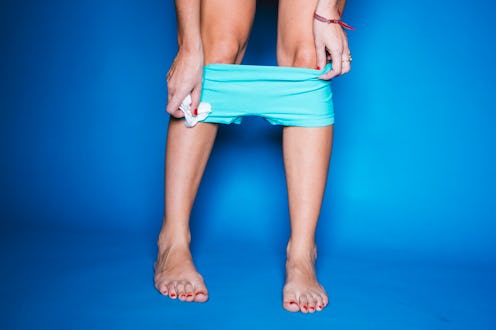Life
7 Things You Need To Know About Your Vulva, According To OB/GYNs

About the half the population has a vulva — and a much higher percentage doesn’t know much about it. What are all of those flaps and folds? Is there too much discharge? Why does it itch? Isn’t it called the vagina? These are all questions that OB/GYNs get from their patients. Dr. Rebecca Levy-Gantt — who has been a gynecologist for 25 years and done “tens of thousands of gynecological exams” — says that the most common question she gets is whether or not someone’s vulva is “normal.”
“They ask about the texture, the size, the roughness the bumps and growths, the sensitivity, the sore areas, and why it doesn't feel or look ‘normal.’” Dr. Rebecca Levy-Gantt tells Bustle. “Unfortunately, this is almost always because they have some idea of what ‘normal’ is — from porn, from things they have read or seen online, or from what other people (mostly partners) tell them. Then, when I look, they definitely look within the wide range of ‘normals’ to me.”
Dr. Angela Jones also deals with the “is it normal??” question on a frequent basis. “I give a lot of reassurance to women that vulva come in all shapes and sizes,” Dr. Jones tells Bustle. “There are many variations of normal.”
Bustle asked Dr. Jone and Dr. Levy-Gantt: What else do you wish people knew about their vulvas? (And before we get into their responses, a quick note about language. Both doctors refer to “women,” which is common. Most people with vulvas are women, but some aren’t. And not all women have vulvas.)
1It’s Not Your Vagina
First things first: Your vulva is not your vagina. “Vulvas and vaginas are not synonymous!” Dr. Jones tells Bustle. “A lot of women don’t realize this and oftentimes when referring to their vulva will call it their vagina. This is a very common mistake. Vulva entails the external female genitalia; specifically, the labia majora/minora, the clitoris, the opening of the vagina and urethra; and the mons pubis. In essence, it’s what you see on the outside when you dare to look ‘down there.’”
2Every Vulva Is Unique
We don’t usually see other people’s vulvas — except in porn. As a result, many people have a skewed idea of what a vulva should look like. And that can lead to some serious hangups.
“Some are dark, some light, some asymmetrical (one side larger than the other), some with fat under the skin, some not, some with rough surfaces and some smooth,” Dr. Levy-Gantt says. “And women should get to know what theirs looks like, with a mirror, with exploration — so they can tell if anything changes, and so they can know what ‘normal’ is for them and realize that that area is not something that needs to be changed, somehow.”
3They DGAF About Your Pubes
“Whether your vulva has hair, or is bare, we as gynecologists don’t care,” Dr. Jones says. “Stop apologizing for your choice in grooming, or lack there of.”
4If It Hurts? Go To The Doctor
Do you have a new itch? Smell? Pain? Dr. Levy-Gantt wants you to make an appointment, now.
“Anything that grows there or feels painful there, or that is new in that area should be brought to the attention of a health care provider,” Dr. Levy-Gantt says. “Things that grow can be cancers, and sore spots can be infections or worse. Don't ask your friends, Facebook, Reddit, or other people that don't know the medical answers! And don't continue to treat whatever you think it is with home remedies, over the counter medicines, or some type of ‘natural’ remedy, especially if whatever it is persists beyond what might be a simple itch of a yeast infection. The reassurance (or the diagnosis) is worth the trip to the medical office or clinic.”
5It Doesn’t Need All Those Products
I hope you’ve already thrown away any douches, but it’s also time to throw away anything else you’ve been using on your vulva, other than scent-free soap.
“Your vulva doesn’t need a special facial, or special lotions, potions, or elixirs, these things oftentimes serve as irritants and will cause a contact dermatitis,” Dr. Jones says. Which, in English, translates into an angry, itchy, burning vulva.”
6There Are More Erogenous Zones Than We Usually Talk About
You’ve probably heard about the clit and the vagina. But did you know there’s a whole lot more to explore when you’re getting sexy?
“The entire area of the vulva, for some, can be an erogenous zone,” Dr. Levy-Gantt says. “There are many nerve endings throughout the labia, skin, para-clitoral area, and at the introital area (the opening to the vagina). It is not just all about vaginal and/or clitoral stimulation. There are pleasurable (and not-so-pleasurable) sensations that can be felt by touching, rubbing, lotion-ing, and stimulating areas all over the vulva, and I think it's a great idea (and can be great fun) to learn, solo, or with a partner, how all of those areas feel to you!”
7Vulvas Aren’t Dirty!
Finally, get that misogynistic idea that your vulva is “dirty” out of your head. “The number one thing I wish was taught in health classes about the vulva is that it is not in any way shape or form ‘dirty,’” Dr. Levy-Gantt says. “Women somehow always get this idea even if instructors or health care providers don't think they are conveying this to their students. Then they spend the rest of their sexual lives trying to shake that idea off.”
There you have it — everything your OB/GYN wants you to know about your vulva.